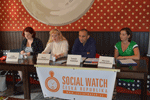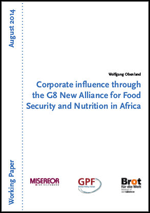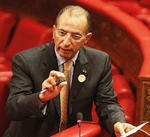Published on Thu, 2014-08-07 12:56
On 30th July 2014 the Czech Social Watch Coalition released the new National Social Watch Report summarizing the development in the year 2013. The title of the report is Czech Republic: Chaos and incompetence in the next year of crisis and it focuses on social development and gender equity, particularly in the following areas: economics, women in politics, social and accessible housing, Roma minority, the lack of community work and human rights agenda in the Czech foreign policy. The publication includes an additional article about the Czech arms export, which is called Czech Republic again equipped dictators with arms in 2013. |
Published on Wed, 2014-08-06 00:00
Some four thousand years ago, King Hammurabi had the laws of his domains between the Tigris and Euphrates rivers carved in stone and placed in front of his palace. The laws were written in the plain language of the people, not in the arcane idiom of the priests, so that everybody could understand them. They were not engraved on clay, so they could not be changed overnight at will, and they were not hidden, so that all were able to access them and learn, for example, that even judges had a duty not to betray the rules in their decisions. |
Published on Mon, 2014-08-04 11:46
In recent times, new partnerships models between governments, business and civil society are increasingly gaining attention. One prominent example is the "New Alliance for Food Security and Nutrition" (G8NA), inaugurated at the G8 summit 2012 in the United States. A new working paper published by Global Policy Forum, Brot für die Welt and MISEREOR, puts a spotlight on how business interests are promoted through the G8NA. To that end, the paper shows how the initiative bundles existing policy initiatives and aligns national policies to corporate interests. The paper concludes that the approach and objectives of the G8NA are highly problematic. The initiative serves as an enforcing mechanism for corporate driven blueprints for agriculture and sidelines national plans and international standards. It is dominated and tailored towards the interests of big corporate actors and is based on a reductionist approach of agricultural “development”. And lastly, the G8NA is poorly institutionalized and disregards fundamental principles of transparency participation and accountability. |
Published on Mon, 2014-07-28 14:05
Following the groundless statements of the Minister of the Interior in front of the representatives of the legislative power against associations and human rights movement on 15 July 2014, and on the basis of his conspicuous tendency to lead invalid accusations against Moroccan associations and organizations working in the field of human rights and democratic development, in an attempt to disparage its efforts in advancing and protecting human rights. |
Published on Thu, 2014-07-24 09:31
A set of 17 sustainable development goals has been adopted after over one and a half years of discussions and negotiations. The Open Working Group (OWG) on Sustainable Development Goals (SDGs) concluded its 13th session (14-19 July) at the United Nations headquarters in New York following long drawn negotiations that stretched through the night of 18 July, finally leading to the adoption of the final document on Saturday afternoon of 19 July. |
SUSCRIBE TO OUR NEWSLETTER







